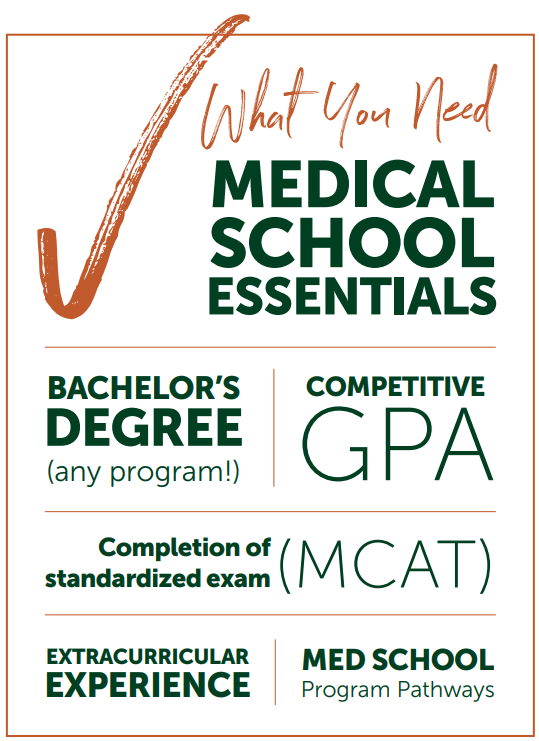As a student interested in pursuing your Doctor of Medicine, you likely have the same question as most med school hopefuls: “What are medical schools looking for?”
The short answer is that there is no set single path to medicine, and Trent’s Medical Professional Stream is designed to provide students with individualized support to promote the development of well-rounded candidates with depth and breadth in their overall achievements, including those in academic and non-academic areas.
So you want to get into medical school? Here is what you need:

Where to start your journey to medical school:
- Choose the school that provides the best fit for you, the degree you are passionate about, and an environment and community that will allow you to flourish.
- Within your scholarly studies, start early to make yourself known to your instructors, volunteer for research opportunities, show breadth, diversity and uniqueness within your degree and study hard.
- Find volunteer and vocational opportunities that demonstrate your skills, and prove you have what it takes to be a great doctor.
Considerations for Doctor of Medicine Candidates
As Canada’s health care system continues to be challenged by social and economic factors, and demographic realities, the future of medical education is focused on developing a well-rounded physician to meet these competing demands.
Medical schools are seeking students with high academic averages, and high Medical College Admission Test scores (where applicable), as well as students with:
- Diverse and dynamic experiences who demonstrate a commitment to their community
- Undergraduate degrees in a variety of disciplines, particularly a discipline they are passionate about—if you study in your field of interest, chances are you will probably do better
- Critical analysis and reasoning, a section now included on the MCAT which captures a student’s ability to recognize the behavioral and social factors that play major roles in health and illness, and interact with biologic factors to influence health outcomes
“…because being a good physician is about more than scientific knowledge. It is about understanding people – how they think, interact, and make decisions. Together with a solid foundation in the natural sciences, an understanding of behavior, perception, culture, poverty and other concepts from psychology and sociology all contribute to the well-rounded physician.”
Darrell Kirch, president, Association of American Medical Colleges
Frequently Asked Questions
- What makes a competitive applicant?
-
The ideal candidate for professional medical programs will have completed a rigorous and coherent course of study, which will provide evidence of an independent, self-directed, and mature learning style. The ideal candidate will also provide evidence of outstanding non-academic qualities, including altruism, reliability, responsibility, perseverance, creativity, and leadership, through this process.
Prospective applicants are advised to pursue courses of study, whether in the natural or social sciences or the humanities, which appeal to them and which have as their aim a broad education and intellectual training rather than merely anticipating a medical curriculum.
Additionally, a strong GPA and strong MCAT score are beneficial to a medical school application, but not a guarantee nor are they necessarily mandatory. These qualifications are just part of the equation for getting into professional medical programs. It is other criteria, such as extracurriculars, that distinguish the successful 15% of med school applicants.
- Do I need to take a specific undergraduate degree to be considered for medical school?
-
There is no 'one degree' that is essential for getting into Medical School. Students with university education in any discipline are encouraged to apply. Medicine requires individuals with strong backgrounds in the social sciences, humanities, physical sciences and life sciences. All programs are treated equally in the evaluation process.
Students are encouraged to choose a degree that you are passionate in; chances are you will do better in a degree that you enjoy! Also consider how your program of study would prepare you for other careers or educational paths if your plans change throughout your undergraduate degree.
- What courses should I take to get into medical school?
-
The vast majority of medical schools do not have specific recommendations for courses or degree programs since no preference is given to applicants who have studied in a particular university program.
However, it may be advantageous, regardless of academic program, to at least gain some exposure to the basic sciences as well as the social sciences and humanities. The aim is to develop a well-rounded education and also to prepare yourself for alternatives to medicine.
- What extracurricular activities should I get involved in?
-
Academic knowledge is only a piece of what you need to master when becoming a doctor. Getting personal and professional experience outside of the classroom gives prospective medical students new ways to hone, develop and acquire alternative skills.
Choose extracurricular activities that allow you to explore new things, push you outside of your comfort and can help you gain valuable skills for a career in medicine, such as communication, collaboration, interpersonal skills, creativity, confidence, perseverance, and independence, just to name a few.
- What scholarships are available for students?
-
The Walker Wood Foundation is available to students who are planning to go to medical school. There are three scholarships available, with funding provided for four years.
Important
Each medical school's admission criteria may vary; the FAQs do not address all variations and are meant as a guide to help you find your unique path to medical school. We highly recommend reviewing the requirements and criteria for applying to the specific medical schools you may be interested in pursuing. Additionally, admission information and selection criteria may be subject to change, so always check with the school you plan to pursue.
For more information on this program, contact mps@trentu.ca

